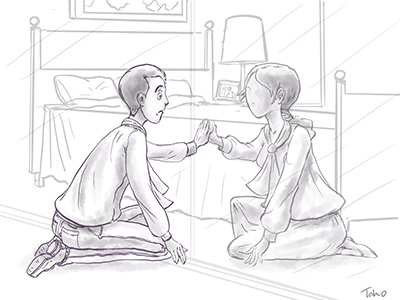
Illustrated by Santosh Oommen
Tonight, you wear Eva’s clothes.
It’s been five months, and until now, you’ve kept yourself from it, afraid to lose her scent in your sweat. Until now, you called yourself an alchemist; you tried to bottle it.
Your lab coat slips off your shoulders. Tonight, you don’t fold it, don’t roll it to avoid creasing. You try on a blouse, lightweight and pale blue. The bow catches on your chest, and you undo the strand as you once undid her hair. You told her you liked it up. What you really liked was the fall, the exhale, the way the curls came to hold you as you traced her stomach with your hands. Her navel, cordless, smelled of oranges.
You rub your neck with your thumb. When your wife dies, so do your senses. You use too much sugar, too much salt. You paint garish things. You would skydive, but you remember your kids need you. Your kids, who look too much like you and not enough like her. You hear a giggle from the next room. They are baking cookies with your mother.
“Jack!” Eva exclaims. She is twenty-one and coming home from her first day interning in a bowed blouse and grey blazer. You are twenty-six, and for the first time, feeling the weight of choosing, of all the opportunities you never took. “I met so many amazing people!”she exclaims, opening her arms wide.“And, okay, yes, I had to make coffee, but they’re letting me do a piece on the local election.” You begin to walk together, leading with your laughter.
“Yes, Eva!” You pull her into an embrace, kissing her shoulder.“It’s all in you, love.” She beams, eyes overwhelmed by smile.
Off with the blouse. It flutters to the ground like papel picado, like a prayer flag. You could move, you and Bea and Will, to Nepal. After a death, people give you a month, close friends, three. Then they move on, and you are frozen on the wrong side of longing.
In Nepal, you could sit still for a very long time.
It was nothing like a car crash. Inevitable. The disease waited until Eva was a success- ful journalist and mother. It creeped until you and Eva had grown intertwined, the way redwood trees formed fairy rings. How to know who you are without her. She was let- ter-pressed onto your skin. And yet, you never knew how it was to be inside that body, inside that mind. You pick up a low-cut velvet dress. It is too tight to wear, won’t fit over your shoulders, but it feels heavy and soft against your chest.
You are returning from the lab late tonight and start thinking of ways to make it up to Eva. Two months ago, you two gathered around the pregnancy test, pointing at the pink + excitedly. Now the life within her reveals itself, a half moon above her pelvis. You stop by the bookstore to pick her up something. You write in the front cover, next to a drawing of an astronaut, “I am more excited than nervous, and I am very, very nervous.”
Entering the apartment, you stop. Eva leans against the counter in one of your favorite dresses, eyes dancing. Its tightness accentuates her baby bump. You cross the room, setting the book down beside her. “Wow,” you say. Eva kisses you deeply.
“Daddy, what are you doing?” Will stands in doorway, his small form frozen. You turn to him, still in the blouse, a parody of his mother. Will begins to cry.
“No, no, Wallaby, it’s okay.” You pick him up, put him on your lap. He sits, playing with the bow, as you sing to him. He falls asleep, and toddler snot and drool spills onto your chest, all over her shirt. Her scent will fade soon.
But Will is alive, and Eva is dead. You play with his curls, which come to hold your hands.
The next morning, you dress for work. Slacks, white button up, tie. Unremarkable.
Half-unbuttoned, the shirt shows Eva’s neck, collarbone, the crevice between her breasts. She wears no pants, lying on your bed. You sit on her thighs, holding her arms together above her head with one hand. “Listen,” you say, tickling her. She giggles. “Listen, you make me joyful. Stop laughing.” You smile, and she shakes silently. You tickle her harder. “Listen, shhh, now. I am trying to express myself.” She attempts to frown. “I love you, Eva. I love you, I love you, I love—” She climbs on top, pins you down.
From now on, you’ll have to be both of you. You smell your children’s hair as you drop them off for school. You leave your room, tickle them until they giggle.





Leave A Comment
You must be logged in to post a comment.